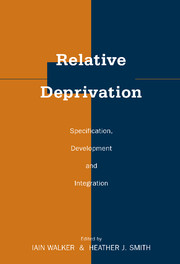1 - Fifty Years of Relative Deprivation Research
Published online by Cambridge University Press: 29 September 2009
Summary
The relative deprivation (RD) construct has been extensively used in social psychology, sociology, and other social sciences for more than half a century. This popularity reflects RD's usefulness for explaining numerous paradoxes (Tyler, Boeckmann, Smith, & Huo, 1997). Why were African American soldiers stationed in the southern United States more satisfied than African American soldiers stationed in the northern United States during World War II (Stouffer, Suchman, DeVinney, Star, & Williams, 1949)? Why did the 1960s urban riots in the United States occur when they did (Miller, Bolce, & Halligan, 1977)? Why aren't working women who earn less than their male colleagues more angry (Crosby, 1982)? The list could continue. The common theme among the answers to these questions is that people's reactions to objective circumstances depend on their subjective comparisons. African American soldiers compared their situation with the situation for local African Americans (a situation much worse in the South than in the North). The urban riots followed a period of economic and political gain for minorities that ironically created a discrepancy between their expectations and a reality that was not improving quickly enough. And, most working women compare their situation with other working women, not with their male colleagues.
Obviously, a concept that can explain so many different phenomena is one worth having in the armory of the social sciences. However, research on RD has progressed only fitfully.
- Type
- Chapter
- Information
- Relative DeprivationSpecification, Development, and Integration, pp. 1 - 10Publisher: Cambridge University PressPrint publication year: 2001
- 9
- Cited by

